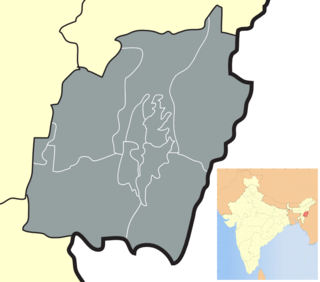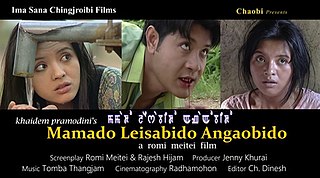Tomba is a Meitei ethnic male given name, meaning little, small, tiny, young. Notable people with this given name are:

Manipur is a state in Northeast India, with the city of Imphal as its capital. It is bounded by the Indian states of Nagaland to the north, Mizoram to the south and Assam to the west. It also borders two regions of Myanmar, Sagaing Region to the east and Chin State to the south. The state covers an area of 22,327 square kilometres (8,621 sq mi). Meitei language is the most widely spoken language and is also the official language of the state, spoken natively by the Meiteis and as a lingua franca by the Nagas, Kukis, Zomis and other smaller communities, who speak a variety of Sino-Tibetan languages. Manipur has been at the crossroads of Asian economic and cultural exchange for more than 2,500 years. It connects the Indian subcontinent and Central Asia to Southeast Asia, East Asia, Siberia, regions in the Arctic, Micronesia and Polynesia enabling migration of people, cultures and religions.

Meitei (/mə́i.təi/), officially known as Manipuri, is a Tibeto-Burman language of the Sino-Tibetan family. It is the official language, the lingua franca and the most widely spoken language of the state of Manipur in northeastern India. It is one of the official languages of the Government of India. It is also spoken in the states of Assam and Tripura in Northeast India as well as in parts of Bangladesh and Burma. It was the court language of the Manipur Kingdom (Meeteileipak) and was used with honour before and during the Durbar (court) sessions before Manipur was merged into the Dominion of the Indian Republic, having its history of existence dating back to 1500-2000 years in accordance to most eminent linguists and scholars, including Padma Vibhushan awardee Indian scholar Suniti Kumar Chatterji. In accordance to the "Manipur State Constitution Act 1947" of the once independent Manipur Kingdom, it was the court language of the kingdom.

The Meitei people or Manipuri people are an ethnic group native to the state of Manipur in northeastern India. The Meiteis primarily settled in the Imphal Valley region in modern-day Manipur, although a sizable population have settled in Assam, Tripura, Nagaland, Meghalaya, and Mizoram; with notable presence in the neighbouring countries of Myanmar and Bangladesh. The Meitei ethnic group represents about 53% of Manipur's population.
Manipuri may refer to:
Indian mythology may refer to:
Meitei may refer to:
Tomba may refer to:

The Meitei script (ꯃꯩꯇꯩ ꯃꯌꯦꯛ) or the Meetei script is an abugida used for the Meitei language, the official language of Manipur state of India. It was used until the 18th century, when it was replaced by the Bengali alphabet. A few manuscripts survive. In the 20th century, the script has experienced a resurgence, and is again being used.

Meitei literature, also known as Manipuri literature, refers to the literature written in Meitei language, one of the official languages of the Government of India. An ancient institution of learning named the Luwang Nonghumsang, later known as the Pandit Loishang, collected the sources of indigenous Meitei knowledge and philosophy until the 18th century. The presence of writing among the Meiteis is assumed to go back to the Kangleipak state under king Loiyumba in the early 12th century. The Meitei script is a Brahmic abugida. It is known only from the Puya manuscripts discovered in the first half of the 20th century. Manuscripts of the 18th and 19th century used the Bengali alphabet. The existence of the Meitei script in the 15th-century hinges on the authenticity of an inscription dated to the reign of Senbi Kiyamba.
Darshana Jhaveri, the youngest of the four Jhaveri sisters, is a leading Indian exponent of Manipuri dance, an Indian classical dance form. She is a disciple of Guru Bipin Singh, and started performing on stage in 1958 along with her sisters. She is one of the founders of the Manipuri Nartanalaya in 1972, which popularized Manipuri dance in India, and is currently headed by her, with centres at Mumbai, Kolkata and Imphal.
Chanu is a Meitei ethnic name suffix for women and may refer to:
Oinam is an Indian Meitei ethnic family name (surname). Notable people with this family name include:

Mamado Leisabido Angaobido is a 2010 Manipuri film directed by Romi Meitei and produced by Jenny Khurai, under the banner of Ima Sana Chingjroibi Films. It stars Kamala Saikhom and Gokul Athokpam in the lead roles. It is based on Khaidem Pramodini's play of the same title.

Meitei mythology or Manipuri mythology is a collection of myths, belonging to the religious and cultural traditions of the Meitei people, the predominant ethnic group of Manipur. It is associated with traditional Meitei religion (Sanamahism). Meitei myths are a part of Meitei culture and explain various natural phenomena, how the human civilization developed, and the reasons of many things happening. Most of the Meitei legends are found in the Meitei language texts.

Meitei input methods are the methods that allow users of computers to input texts in the Meitei script, systematically for Meitei language.
Moirangthem is a Meitei ethnic family name (surname). People with this family name include:
Konthoujam is a Meitei ethnic family name (surname). Notable people with this family name are:
Saikhom is a Meitei ethnic family name (surname). Notable people with this family name are:
Tombi is a Meitei ethnic given name, meaning little, small, tiny, young. This name is common to both genders. Notable people with this given name are:
Kshetrimayum is a Meitei ethnic family name (surname). Notable people with this family name are: